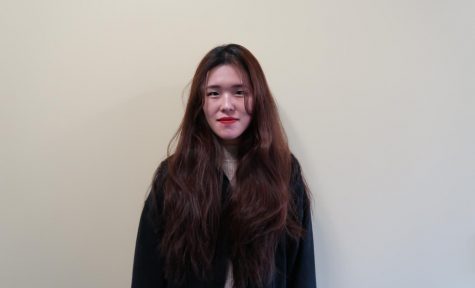Homesickness is a New Year tradition
Assistant Academic Affairs Vice President Kristen Majocha makes red pockets with change in them Friday for Chinese New Year.
February 14, 2018
The rooster walks away with its cock-a-doodle-doos, and the dog comes wagging its tail. Across a giant pond of water, a country is decorating itself in bright red colors.
Yes, the year of the dog is approaching.
Chinese New Year is to Chinese as Christmas is to Americans. It is the day when the entire family eats dinner together, watches the televised Spring Festival Gala together and makes dumplings together.
For Pitt-Johnstown Chinese students, it means celebrating Chinese New Year on another continent across the Pacific, away from their families only imagining the taste of their family reunion dinners.
Luckily, although they are not able to celebrate with their families, Pitt-Johnstown Chinese students have each other and support from school officials.
Pitt-Johnstown junior and Chinese Student Association chair Diao Xianhua said that celebrating Chinese New Year together helps with homesickness, and it is a great chance for students to chat with each other.
He said that the celebration he participated in during his freshman year was the most memorable.
“We ordered food from outside, and a lot of people came, including some American students; the atmosphere was great,” he said.
However, Chinese New Year’s Eve activities should be improved, said Diao, because Chinese New Year’s Eve is important to many Chinese students.
“I hope we could (include activities such as) making our own dinner this year,” he said.
Freshman student Chang Jiangtian has celebrated Chinese New Year in America, without his family, for several years.
Chang said he went to high school in Pittsburgh, and he went half a year early, so this is his sixth year in the States.
He said that the first three years were the hardest. He said he missed home a lot and would cry while watching the Spring Festival Gala.
“But, it gets better,” Chang said.
When he was still in high school, he said that he would eat hot pot with his friends and sing karaoke for Chinese New Year.
Chang said he plans to go back to his high school this year to celebrate with his friends.
Although he still gets homesick sometimes, Chang said that he is getting used to it, and these celebrations to him now are just a way of keeping in touch with his high school friends.
Although it is not the same as celebrating in China with family, at least one school official is trying to make the students feel like they are at home at Pitt-Johnstown.
According to Assistant Academic Affairs Vice President Kristen Majocha, the celebrations became a major event at Pitt-Johnstown four years ago.
She said that the international students’ advisory board was formed seven years ago, and they focused on the international students’ academics first.
When everything was settled, they then turned their focus to the different cultures of the students.
She said she has been to all four of the Chinese New Year celebrations and that she loved them.
The second celebration left the most impression on her, she said.
“(That year) I made mooncakes (for the Mid-Autumn Festival, but they) failed miserably.
“I learned that Chinese traditions can’t be rushed, (they) have history and that can’t be substituted.”
Majocha said that same year for Chinese New Year she prepared little red packets with money for the Chinese students, which is a tradition on Chinese New Year.
She said the students were grateful, and she felt that, by doing these things, she is gaining trust from her students.
“I learned a lot about the games, the food, the culture and the traditions. Tradition is vital, it makes me think about the differences of culture,” she said.
However, the school administration can mess up sometimes, too.
According to senior student Zhang Peijia, 2016’s celebration was unforgettable due to a mishap.
“Somehow the school advocated about (the celebration) to the whole school, but there was only enough food for the Chinese students.
“Many American students didn’t know how to eat hot pot, so they started eating the meat raw,” she said.
Zhang said they had to tell Diao to show them the proper way to eat it, and many Chinese students were still hungry after the celebration.
Majocha said that, when they were planning the event, they were expecting students to take turns to eat, but, in the tradition, Chinese people would sit there all night eating and talking.
She then realized eating hot pot is like eating a Thanksgiving or Christmas dinner; it’s not all about eating, it’s about spending time with family and friends.
“Trying to blend celebrations without education was ineffective, so the following year we drove the students to Squirrel Hill and ate at a restaurant,” she said.
For the upcoming Chinese New Year, Majocha said she is going to prepare little red packets for the students and learn to say “Happy New Year” in Chinese to them.
“I am practicing to say ‘xin nian kuai le,’ Happy New Year in Chinese, right now. Hopefully I will be able to say it (at the celebration).”









